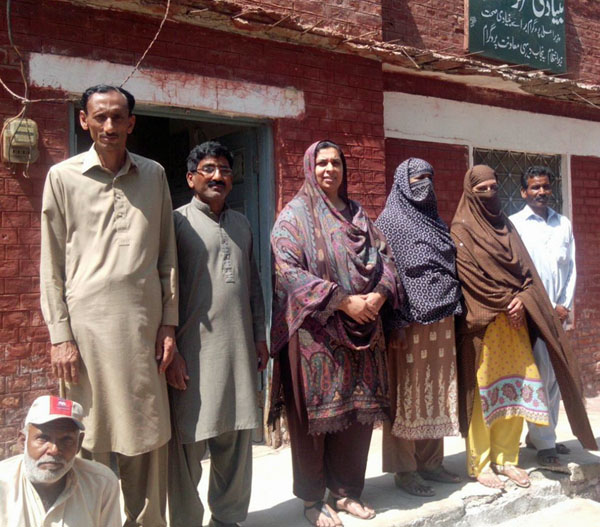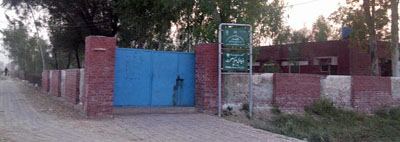Rural Roundup: Rabia Afridi in collaboration with Sameena Shah

Photo: the team at BHU Chak 18 - Rabia in centre with two dispensers and Peon (Polio affected) at left and midwife, LHV and Sweeper at right.
A story from Pakistan.
The Beginning: Introducing myself and CHAK 18
I work in a Basic Health Unit (BHU) in CHAK 18, situated to the East of the Changa Manga forest in the Punjab province of Pakistan since 2014. It is a small underdeveloped village of 3795 inhabitants, and is part of the regional Union Council which has a total population of 7385. The Union Council includes CHAK 15, 17 and portions of the majestic forest itself in addition to CHAK 18. It is very cold in the winter and becomes extremely hot in the summer.
Residents include farmers, livestock owners and dairy farmers amongst others. Surrounded by fields, the village center contains a few small shops, a government school, four middle level private schools, the BHU of CHAK 18 and my farmhouse. A small stream flows through the village and is used by everyone for just about everything. The men use it for bathing and cooling down, the women use it to wash clothes, the children use it to swim and play, the farmers use it to water their crops, and the buffalos and horses use it for drinking and bathing. The major crops are wheat, maize, sugarcane, cotton and cattle fodder. Other farming activities include livestock rearing and dairy farming. The poorest weave blinds, baskets and trays from locally grown reeds.
My name is Rabia Afridi, the youngest and most pampered of my family. I was born into a Pathan family from the North West province of Pakistan, now called Khyber Pakhtunkhwa. I graduated from Khyber Medical College, Peshawar and completed my House Job in Khyber Teaching Hospital. I had always wanted to be a doctor and was looking forward to an ambitious medical career after completing my studies. In keeping with local custom, soon after graduation I was married to the son of a Punjabi landlord family, an engineer by profession. We lived in Lahore for five years, where my husband worked in his father’s engineering firm and I looked after my family and four lovely daughters.
Unfortunately, after his father’s death, my husband was denied his rightful position in the engineering firm that his father had worked day and night to build. Depressed and dejected, my husband decided to move to his ancestral agricultural lands in CHAK 18 and start farming. I had a hard time adjusting to this move as I had been used to a very comfortable life in the beautiful city of Lahore and felt isolated and alone. My husband drowned himself in work as he toiled day and night to develop his lands while I struggled to come to terms with the undependable electric supply, erratic internet connectivity, lack of cooking gas, the abundance of dust and armies of sticky flies!
Our farmhouse was still under construction and I could not understand the strongly accented Punjabi spoken in CHAK 18. There were times when I thought that I will lose my Urdu and Pushto and still not be able to communicate in the local Punjabi.
Eventually, the farmhouse was completed, a biogas plant was put up for cooking and solar panels were installed to overcome the problem of undependable electricity and I had begun to make myself understood in Punjabi.
Despite these small victories I felt that I had lost everything and there was nothing more to expect in life. I was now buried in the remotest plains of Pakistan with no one to speak to in Urdu, Pushto or English, except my family. Worst of all, I believed that I would never be able to work as a doctor; that my life was destined to be a never ending battle with dust, flies, incomprehensible Punjabi and repetitive conversations about crops, harvests, tractors, manure, cattle and soil quality. I can only describe my situation at the time as the bitter gulp that could neither be swallowed nor spat out!

Allah, however, had it all planned for me. A vacancy for a medical officer opened in the BHU (pictured at right) located right in front of my house. It had been constructed in 1984 on the land donated by my husband's grandfather. I applied for the post and was so happy when I was selected and joined as medical officer in charge of the entire Union Council on 23rd September 2014. It is a three roomed building with a dispensary, a two bedded ward and a delivery room. There are 10 staff members that comprise of the doctor, dispenser, Lady Health Worker (LHV), the school health and nutrition supervisor, sanitary inspector, vaccinator, sweeper (janitor), peon (office boy), and guard. The boundary wall was breaking down, there were irregular gaping holes in place of windows, and the roof appeared to have eroded away … but it was also my first clinic.
Everyone, including the peon, was addressed as ‘doctor’ by the patients. Amazingly enough, both the peon and sweeper were experts in dispensing medicines, giving injections and managing patients’ complaints. My first day at work started with the discovery of the local injection technique which was to give the injections directly through the clothes anywhere into the upper arm straight into the flesh. There was no concept of infection prevention, aseptic measures, injection site or technique. The emergency tray was in a chaotic state with only poor quality transparent plastic gloves and some rusty instruments. This was a shock as I had been trained in a high quality teaching hospital with a supply of medical equipment by highly trained foreign qualified professors and here I was in a broken building with an empty tray and plastic gloves.
As I stood there, trying to come to terms with my clinic, my first patient arrived. She was a multigravida, fully dilated and ready to deliver her fourth child. I asked for some gloves, there were none, so with the help of my team, we gave thanks to have delivered a healthy baby girl of approximately seven pounds (3.2 kg) as there were no weighing scales. After stabilizing the patient I sat down to write my Joining Report and a list of equipment and supplies needed for my BHU in CHAK 18. It included an autoclave, oxygen cylinder, sterile gloves, and medical instruments amongst other requirements. We finished the day’s work with a jointly passed resolution that all those who would come late for duty would be received by a round of applause by the entire staff. This brought my first day to an end and I went home across the road to my farmhouse with the solar panels with a mixed sensation of fulfillment, apprehension and excitement, wondering what tomorrow would bring.
Editor's note - I'm sure if you have read this far you will be eagerly awaiting a future installment from Rabia about her ongoing work.